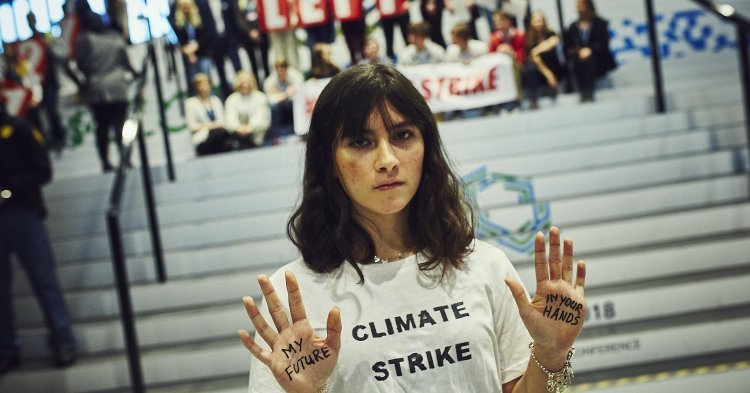At first, she planned not to go to school until the parliamentary elections in September, as she thought that none of the campaigns and the measures the individual parties wanted to take against climate change were giving the issue the attention it deserved. Greta sat there alone, day after day, and quickly got a lot of attention and eventually sparked protests all over Europe. But does it really have an impact on climate policy? Or are all these young people demonstrating without any prospect of being heard?
2015 – Climate summit in Paris
In 2015, at the UN climate summit in Paris, the global community decided that all countries would work together to ensure that the average temperature on Earth would not rise by more than 1.5 degrees Celsius compared to pre-industrial times. Greta’s home country was not quite on track to meet these requirements, even though Sweden is a rich and progressive country that promotes being eco-friendly, sustainable and green according to Greta. And so she decided to go on strike, even after the parliamentary elections, and skip school every Friday – until Sweden would reach its climate target.
Sweden was not the only country to lag behind in terms of the requirements. In Germany, too, it seemed quite unlikely that the climate goals would be achieved – especially after the new policy decisions regarding the coal industry. When the 2015 climate agreement was signed in Paris, we were on the way to raise the average temperature by 2.8 degrees Celsius compared to pre-industrial times. It was thus decided that a review should be carried out every five years of the measures individual states are taking to achieve and advance climate targets and of how successful they are in implementing them.
Summer 2018 – Greta’s school strike
In newspapers and via social media, the news of the striking schoolgirl from Sweden quickly spread. Her popularity was growing just as fast as Greta’s fame. By November already, she was invited to hold a TEDX talk in Stockholm, at the age of only 15. She told how she learned about global warming and climate change when she was eight years old and how it was completely incomprehensible to her that people didn’t talk about it every day, working to solve this crisis. She talked about how adults come to her, smilingly saying that she better return to school, then study later and become a climate researcher to save the climate. But the solutions have already been found, Greta denounces, but they are not being put into practice.
Why, she asked, should young people still go to school and study for a future that may never come? What is most impressive is her observation that politicians, most of whom are over 50 years old, decide about their future in which they themselves will not take part in. “If I turn 100, I will still be alive in 2103. Most of the climate targets are set for the time until 2050. With a little luck, I haven’t even lived half my life”. In other European countries, first groups of students started following Greta’s example. In the Netherlands and Germany, the first school strikes took place in September, in October and November other countries like Belgium, Switzerland, England and Finland followed suit.
Winter 2018 – Fridays for Future
In Germany, the movement is called “Fridays for Future” and is divided into regional groups that communicate autonomously within WhatsApp groups and spread their messages on social media and flyers. By February 2019, “Fridays for Future” counted more than 155 local groups in Germany. Oftentimes, they get headwinds from conservative politicians who think the young people negligently skip school. Teachers are asked not to excuse their pupils for environmental demonstrations and to take note of these absences in the end-of-year reports. But student voices objected: what could they be more proud of than a remark that proves their engagement against the climate politics and for the environment?
Governments of the respective federal states handle the situation with varying degrees of severity. Ultimately, it depends on the schools how hard they choose to punish the truants and whether they will excuse the absence.
December 2018 – UN climate conference
In December 2018, the 24th UN Climate Change Conference was held in Katowice, Poland. The first reviews of the measures taken by the states to comply with the Paris agreement on climate change had already taken place. In Katowice, they were further tightened: As of 2020, all countries that signed the agreement shall accurately record and report their measures taken to reduce the greenhouse gases they emit, as well as their actual emissions. The methods used to measure emissions must also be disclosed.
Every five years, a climate balance shall be drawn up to assess the effectiveness of the measures taken. The financial resources that the states invest in their climate policy should also be scaled up by 2025. States not complying with the conditions or implementing too few measures or insufficiently are to be made public by the UN according to the ‘naming and shaming’ principle: since the UN cannot impose any real sanctions, this procedure is what has proven most effective in the past.
Greta also travelled to Katowice – by electric car and her father. She thought all the decisions were too vague and too far in the future. In her speech, in which she accused politicians of not wanting to face reality in order not to make themselves unpopular, she said: “I don’t care if I’m popular. I want justice concerning the climate issue and a planet on which we can live.” She wants everyone to finally stop veiling the truth and start acting, especially those having the power and wealth. Greta stressed that the burden of climate change was mainly put on the shoulders of the world’s poorest countries. “You keep saying you love your children more than anything else in the world. And yet, you steal their future right in front of them.”
December 2018 – Prohibition of single-use plastic
Also in December, the EU banned the production and use of single-use plastic products. This includes items such as straws and cotton buds. This was perhaps a first step in the right direction, but there is still a ridiculous amount of plastic packaging in everyday life: vegetables and fruit, pasta packaging, hygiene products, etc. etc. It is difficult to get by without plastic, even if one consciously tracks one’s own plastic consumption and tries to minimise it.
The fact that in Germany some of the plastic that used to be a firm part of daily life has disappeared in recent years, such as free single-use plastic bags in the drugstore, conveys the impression that the country is on the right track, perhaps even progressive. However, statistics tell a different story. The consumption of plastic per day and person in Germany is half a kilogram on average, the total annual consumption of plastic is 14.8 million tonnes. This puts the European nation in third place, behind the USA and China. A sobering picture.
January 2019 – World Economic Forum in Davos
In January 2019, politicians, researchers and climate activists met in Davos for the World Economic Forum. Unlike in Katowice, climate change was not the only concern but it still facilitated the exchange between high-ranking government representatives, researchers and economists. Important discussions took place not only in the official panel discussions and meetings, but also in-between, in the hallways so to say. According to the press and the official programme, the main topic was Brexit – despite the fact that the World Economic Forum had declared climate change to be one of the five biggest problems of our time in its risk report published shortly before the Davos meeting.
Greta Thunberg also attended the convention, travelling about 65 hours by train. She was once again the only one: never before had so many participants travelled to the Swiss town in a private jet like this year. To the adults who, according to her, liked to tell success stories from their political and economic lives, she made an urgent appeal: in climate policy, everyone had failed and that was why she wanted “you, the attending and the absent rulers of the world, to act as if we were in a crisis. For that is what we are. And I want you to act as if your house was on fire. Because it is.”
Apart from Greta, few in Davos spoke of the climate matter. It was put forward that the German automotive industry in particular was suffering from the new emission and consumption standards and that production was only slowly returning to normal. Greta was hence surrounded by people who thought of environmental protection as being hurtful to their business.
February 2019 – The coal exit is decided
In February, a decision was taken in Germany to phase out coal. More precisely, when this should take place. In an open letter the ever-growing campaign, “Fridays for Future”, organised primarily by school and university students, called for the ‘coal exit’ by 2020. Germany’s climate targets for 2020 and 2030 could only be met by a rapid exit from lignite: “It is unlikely for Germany to have a similar chance of making such a far-reaching contribution to protect the climate”.
In addition, more than 10,000 young people gathered in front of the Ministry of Economics and Energy in Berlin on 25 January to demonstrate for a fast exit from coal. They were there, they were loud and they did not let the Minister of Energy and Economy, Peter Altmaier, who was visibly swamped, have his say. They were bitterly disappointed, however, by the results of the ‘Coal Commission’: Germany decided to phase out coal as of 2038. The climate target of raising the earth’s temperature by only 1.5 degrees Celsius was now definitely out of reach for Germany. Moreover, the Commission did not guarantee for all endangered villages to be preserved and set a very slow phase-out pace beginning in 2022. Those demonstrating announced – as did Greta – that they would continue to strike every week until something would change. "If necessary, even on all 991 Fridays until the coal phase-out.”
Politicians and concerned adults reacted as expected: They asked the young people to strike after school and on weekends. Their point was now clear and reached the older generation. Why spoil their future because of absence from school? Other voices accused the young people and Greta of not really being interested in the climate and realistic politics. In fact, some claimed, the young people were only putting the climate forward as an excuse to skip school. And Greta instigated them to do so.
Greta has been heavily criticised – especially online
It is generally noteworthy that much of the criticism that Greta has to face, especially on the internet, is rarely related to her demands in terms of content. Since her statements regarding the state of the climate are hardly deniable, some politicians and entrepreneurs probably see no other way but to cast doubt on Greta as a person. They question that a girl who has just turned sixteen can write such eloquent speeches as she does. They accuse her of being instrumentalised by her parents for their personal advantage. They claim that by suffering from Asperger’s, a mild form of autism, Greta is unable to understand to grasp and denounce the status of the climate, politics and the economy.
These reactions show all the better how right Greta is to accuse the decision-makers in our world of failure: Any adult who feels compelled to personally attack a 16-year-old without being able to name errors in terms of content or illogicality should be questioned. And not only by young people, but by everyone. Because if we were honest, everyone would agree that the least of our problems is young people skipping school on Fridays.
Greta has not only become a pioneer in this movement, but also a key figure. And that is what makes her so important. It helps young people to see that Greta is invited to present her demands at important political meetings and that her voice finds a platform. This gives hope to young people. Hope and optimism that, although some are still too young to vote, they will be able to make a difference.



Follow the comments: |
|
